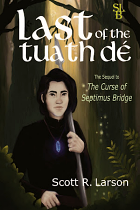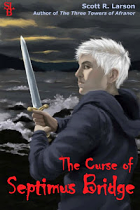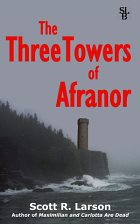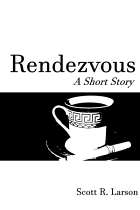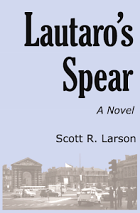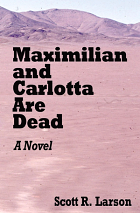Y tu mamá también (And Your Mother Too) ★★☆☆
One old cynical line about Mexico goes roughly something like this: Mexicans are the children of a pillager (the Spanish conquistador Hernán Cortés) and a whore (the Aztec woman Malinche). This flick by Alfonso Cuarón (Great Expectations), which is essentially a raunchy teen road movie with slyly serious intentions, updates that image into a ménage à trois that includes a beautiful Spanish woman (Maribel Verdú) and two randy Mexican boys (Diego Luna and Gael García Bernal), one from the privileged class and one from the working class. Now, road movies about two pals and the woman who, um, comes between them are nothing new, but mostly these are French films starring (depending on the vintage) Jeanne Moreau or Gérard Depardieu. This film clearly makes a claim to that lineage, but its sensibility would not be out of place with the Porky’s or American Pie crowd. Indeed, at first the movie seems downright prurient, but as its story about a drive to beach that isn’t supposed to exist unfolds, interesting things happen. And I don’t just mean the way the film climaxes (so to speak) by making literal what most buddy movies merely keep in the subtext. We keep catching glimpses of Mexico, just out of the way of the main action. The journey takes in a society wedding that includes Mexico’s crème de la crème as a well as a tour through Oaxaca and Puebla where we witness rural life, picturesque traditional rituals, and aggressive law enforcement by the federales. This fascinating and revealing portrait of Mexico, seen on the periphery, is much more interesting than the somewhat predictable buddies-coming-of-age story at the film’s center. (Seen 15 July 2002)
Ya lyublu tebya (You I Love) ★☆☆☆
Modern Russia, in this film anyway, looks surprisingly similar to the West. Yuppies are stressed out in their high-pressure jobs, trying to fit in romance in their few spare hours. Timofei and Vera seem made for each other. She is a news reader on television. He makes TV commercials. They are both young and attractive and are immediately attracted to one another. Things couldn’t be better. But things go awry when a young homeless man named Uloomji falls on the hood of Timofei’s car, and he winds up bringing him home to make sure that he is okay. Soon we have a romantic triangle, as Timofei tries to figure out which way he really wants to swing. This movie by Olga Stolpovskaja and Dmitry Troitsky is a bona fide European sex comedy, and I don’t mean that in a good way. In the worst French tradition, it tries to mine humor by presenting awkward situations for us to laugh at without bothering to make them particularly funny. People’s exaggerated reactions alone are supposed to do the trick. One interesting thing we learn (but not from this movie, only from the film festival program notes) is that there is actually a Buddhist European nation. It is one of Russia’s autonomous republics, and Uloomji, a Kalmyk, is one of its citizens. Among the many tangents in this rambling story that don’t work is Uloomji’s family’s very non-Zen-like reaction to finding out he is gay. (Seen 6 July 2005)
The Yank ★★☆☆
There have been other movies about the culture clash between Americans and the Irish, but this little flick zeroes in on a specific aspect of that theme that has long been ripe for harvesting—the peculiar attachment Irish-Americans in particular have for the auld sod and the disconnect it has with modern Eire. Following (with more slavishness than commitment) the conventions of a romcom, this debut feature by Sean Lackey stars the writer/director as Tom, an Ohioan feeling confined by his Irish roots. His parents’ lives revolve around activities like the six-month countdown to St. Patrick’s Day and the annual replaying of the 1994 Ireland-Italy World Cup match, and his mother nearly collapses—not unlike Mama Peterson in Bye Bye Birdie—at the thought that Tom might have an interest in a Greek-American girl. When Tom’s pal Marty marries a Dubliner and brings his pals to Ireland for the wedding, the yanks’ notions of being “Irish” finally get a long overdue reality check. At the same time, though, the film has no problem exaggerating for comedic effect how the Irish appear to the Americans. Everything from the famous full Irish breakfast to right-hand steering is brought in for a laugh. For a film that seems to have had no budget, there is an impressive roster of filming locations—everything from the Rock and Roll Hall of Fame to the Guinness brewery at St. James’s Gate, where our lads make a pilgrimage of quasi-religious proportions. It also has some familiar faces, including Fred Willard as Tom’s dad and (who else?) Colm Meaney as a distant relation in County Clare. The script and the direction could have used some serious tightening. Some of the scenes nearly feel improvised, and potential plot threads are introduced and then promptly dropped. Still, it’s hard not to smile at many moments. Especially amusing are Derdiu Ring, as a B&B proprietress, trying to outdo Pauline McLynn’s character from Father Ted, and Martin Maloney (of Hardy Bucks fame) delivering a hilarious monolog on everything that’s wrong with Americans in a cockeyed homage to Victor McLaglen in The Quiet Man. It’s a great moment that, like so much in this movie, frustratingly doesn’t lead anywhere. (Seen 17 July 2015)
The Year of My Japanese Cousin ★★★☆
The title The Year of My Japanese Cousin is really a bit too literate for this lively and entertaining flick. (Maybe that’s because it had funding from the Corporation for Public Broadcasting, although it would be more appropriate for MTV.) It is essentially a grunge version of All About Eve with Seven Year Bitch’s Selene Vigil in the Bette Davis role. She is excellent as Stevie, the driving force behind a never-quite-made-it Seattle band called Scubaboy. She is pushing 30 and getting desperate to make the band a success. One day a distant cousin from Japan appears and, before Stevie knows it, Yukari has not only eclipsed her in the band but also with her boyfriend and just about every other aspect of her life. This film was made on the cheap, and it shows. But it is a lot of fun and to my mind portrays a much more authentic view of twentysomething life on Capitol Hill than did Singles. It doesn’t have a distributor yet, but it could eventually show up on PBS. (Seen 20 May 1995)
Year One ★★☆☆
Disclaimer: I only saw this movie because it hadn’t occurred to me that Public Enemies would be sold out. So I went in with a minimum of mental preparation which, as it turns out, is probably the best way to go in. The key question here is: is this, as some critics have complained, a religious spoof for people (read Americans) who find Life of Brian too challenging? Or is it just your basic buddy road comedy with a strange The Flintstones-meet-The Old Testament kind of vibe? Well, it helps to keep in mind that director and co-writer Harold Ramis (Caddyshack, Groundhog Day, Multiplicity) got his start on the wonderfully and screwily funny SCTV. In other words, it is more provocative than subversive. And it made me laugh numerous times. The annoyingly obnoxious persona of Jack Black and the sweetly callow shtick of Michael Cera make a pretty good buddy comedy team. And there are many memorable comedic turns by the likes of David Cross (as a weasely Cain), the always-wonderful Hank Azaria (as a circumcision-obsessed Abraham), Christopher Mints-Plasse (“McLovin” in Superbad, here as an anachronistically tongued Isaac), English tough guy Vinnie Jones (very funny in the Bluto role), Oliver Platt (in a role seemingly calculated to draw boxes of angry protest letters) and Ramis himself as the somewhat dim father of Cain and Abel. As is typical for this kind of movie, the female roles are pretty perfunctory, but June Diane Raphael, Juno Temple and Olivia Wilde manage to make memorable impressions anyway. Some writers who take these things too seriously have charged that this movie is anti-religion, but to me it merely seems to be advocating intervention to install democracy in the Middle East. In fact, this movie might actually boost interest in religion, as many people in its target demographic may have to go find a copy of The Old Testament, if only to understand some of the funniest jokes. (Seen 1 July 2009)
Yellow Submarine ★★★☆
I am guessing that more than a few baby boomers have to think a bit about whether they actually saw this movie in the 1960s or if they only thought they did during a drug trip. Newly restored for its half-century(!) anniversary, this flick captures such an incredible amount of pop culture/music/attitude/trappings of its time that it nearly qualifies as an LSD flashback. It is the movie that has always tended to get overlooked among the trio of big-screen Beatles outings (along with A Hard Day’s Night and Help!)—mainly because it was a mere cartoon. In fact, it has lately become rightly regarded as some sort of art-house curiosity/masterpiece. It was the sole feature film of Toronto-born animator George Dunning, and its collage-like style of mixing simple drawings, photo-realistic images and psychedelic backgrounds begs comparison with the work that Terry Gilliam did for Monty Python’s Flying Circus. Dunning and producer/writer Al Brodax also worked on The Beatles TV cartoon show, which had a very different style than this, evoking the lads’ Hard Day’s Night personas with actors, as here, providing the speaking voices. (Not to worry, the great selection of songs, ranging from “Eleanor Rigby” to “Lucy in the Sky with Diamonds,” are all the real deal, and this is the ideal way to experience them.) This movie is fully immersed in the Sgt. Pepper period. In fact, the screenplay has quite a bit of mind-bending fun introducing Sgt. Pepper’s Lonely Hearts Club Band as separate characters and then reconciling their coexistence with the Beatles. Indeed, there is much clever wordplay throughout as well as a veritable embarrassment of riches in visual and musical puns. The movie’s metaphysical journey evokes everything from Gulliver’s Travels to Alice in Wonderland to The Wizard of Oz, as the pop stars deadpan their way through the sorts of cosmic fantasias we have come to love from the most imaginative of Brit TV sci-fi. I found one scene in particular—in which the quartet are made to age into doddery elderness—extremely poignant, in light of knowing that two of them would never get to reach that stage of life. At the film’s very end, however, the animation gives way to the four lads on screen in the flesh, looking as young as babies and making us feel like it is 1968 all over again. (Seen 8 July 2018)
Yesterday ★★★☆
Despite a premise that is kind of hard to resist—especially for someone who grew up at precisely the right time for the Beatles to have been his seminal musical influence—this movie had to work surprisingly hard to win me over. It is an interesting combination of two talents. It is directed by Danny Boyle, but not the Danny Boyle with the grimness of Trainspotting or Slumdog Millionaire but the sunnier Danny Boyle of Millions. It is written by Richard Curtis, whose fanciful imagination tickled us for years with Blackadder and Mr. Bean and tugged at our heartstrings with Love Actually, About Time and even Mamma Mia! Here We Go Again. But the mashups do not end there. This is a fairly standard sentimental romcom. It is also the old story about a struggling artist suddenly finding success and then realizing it wasn’t what he thought it would be. And it is also a what-if/alternate-reality fantasy. Mostly, though, it is a tribute to the Beatles generally and to the music and lyrics of John Lennon and Paul McCartney (oh yeah, and George Harrison) specifically. That is what works best about it. Frankly, I don’t know that I ever bought the love story. Himesh Patel is a perfectly fine and likeable protagonist and just good enough a singer to carry the conceit but not so gifted that we cannot identify with him. In the nearly-thankless pining-away-friend-zoned-female role, Lily James is absolutely Keira-Knightley-ish circa 2003. And Ed Sheeran definitively proves he has acting chops worthy of more than just Bridget Jones and Game of Thrones walk-ons. But no, the character arcs are never anywhere near as interesting as the idea of trying to conceive of a world where the Beatles never wrote or sang any of their music. The film makes us ponder all that would be missing from our lives and our culture, popular or otherwise. It also poses questions about how much a time and place matter when it comes to a talent catching fire. Would the music work as well if it were written today or if somebody else was doing the singing? In the end, though, what makes this movie truly memorable and gives it its emotional power is an unexpected and perfectly played scene toward the end. It is a wonderful surprise that cannot help but make anybody of a certain age (if not everyone, really) well up with a sense of grace and peace. (Seen 17 July 2019)
Ying Xiong (Hero) ★★★☆
I wonder what it means that Asians seem to be so much better than westerners at portraying their myths and legends on screen. In saying that, I am comparing this Chinese visual tour de force by Yimou Zhang (Raise the Red Lantern, Lumière and Company) to Wolfgang Petersen’s less-than-inspiring Troy, although I suppose I could make a more favorable comparison with Peter Jackson’s Lord of the Rings trilogy which, while not strictly based on age-old western myths and legends, is based on a work that is certainly steeped in them. But another type of western film comes to mind as we watch the poetic spectacle of this movie. Think about it. The harsh desert landscapes marked with towering stone monuments. The man with no name. The quest. The deadly duels. The uneasy alliances. The turnabouts and double crosses. Yes, this is a spaghetti western. Sergio Leone himself couldn’t have done it better. Americans have embraced this movie, despite a somewhat confusing Rashomon-like story and a heavy dose of metaphysical mumbo-jumbo and intricately convoluted logic and codes of honor. But I suppose three Matrix movies helped grease the skids in the States for all that, as well as for the ballet-like aerial sequences, which are gorgeous to watch but seem strange to Yankee eyes. Never have these flying stunts seemed so graceful and dream-like. Like so many things in this movie, they are so beautiful to watch that it hurts. (Seen 11 October 2004)
Yi ngoi (Accident) ★★★☆
Here’s another bit of high-concept shorthand that you may not have been expecting. This well-executed Hong Kong flick is fairly reminiscent of Francis Ford Coppola’s The Conservation, with a bit of those Final Destination movies thrown in for good measure. We know we are in for some shocks from the opening frame when we see a woman have a rather unfortunate encounter, in slow motion, with a car’s windshield. But the shocks are actually few and far between, but knowing they are inevitably coming keeps us on edge throughout. At heart, this is a psycho-thriller. Our anti-hero, a man called The Brain within his tight-knit group of secretive professional assassins, has devised a fairly fool-proof technique of staging elaborate Rube Goldberg-style set-ups that make the victims seem to be not targets but hapless people who were simply in the wrong place at the wrong time. But, the film implies, if you are in the business of engineering apparent accidents, can you ever believe that anything that happens is purely an accident? Another layer of emotion and paranoia is added by the fact that his own beloved wife was herself the victim of, you guessed it, an accident. This impressive movie by Pou-Soi Cheang causes those of us who have always enjoyed Hong Kong movies for their outlandishness (and occasionally amusing subtitles) to appreciate that there is much mature and intelligent filmmaking going on there as well. (Seen 21 February 2010)
You Are Not My Mother ★★★☆
Roddy Doyle meets Guillermo del Toro? Yeah, kinda. On one hand, this is one of those flicks that the Spanish have often done so well (as well as the Mexican del Toro in Pan’s Labyrinth) in which a horrendous real-life situation, seen through a child’s eyes, transforms magically into a supernatural ordeal. The viewer is left to ponder whether the story is some sort of allegory or a genuine otherworldly horror. Simultaneously, this movie is a specimen of gritty social realism about adolescent life in a North Dublin housing estate, and the screenplay makes effective use of its Halloween time setting and northsiders’ penchant for illegal bonfires. It also nicely contrasts the contemporary setting with hoary Irish folklore, in particular the changeling legend. The cast are excellent, starting with Hazel Doupe as Char, barely coping with a mother and granny unable to give her the support she desperately needs. Carolyn Bracken is alternatively charming and frightening as Char’s off-her-meds mum. Her performance has the power to put even the most ardent Joe Dolan fan off one of his best known songs. Ingrid Craigie goes from sympathetic to creepy as the granny who may be more nuts than her daughter—or who maybe is the only one actually comprehending what’s really going on. Jordanne Jones is winning as the schoolmate who goes believably from taunter to supportive friend. This accomplished debut feature is the work of writer/director Kate Dolan, who has previously made several shorts, including some festival award-winners as well as music videos for the indie band Pillow Queens. Is this actually a horror movie? Personally, I would call it a sometimes tense psycho-drama with possible supernatural overtones, but that’s a mouthful and not the easiest marketing sell. If you are looking for gratuitous jump scares and gallons of gore (as opposed to well played drama with judiciously upsetting set-ups), you are not who this is aimed at. This is a thinking person’s dark tale and, as such, an excellent choice for Halloween viewing. You Are Not My Mother, which premiered last year at Toronto’s film festival, then went on to win the Jury Prize for best film at France’s Festival international du film fantastique de Gérardmer before earning Dolan the Discovery Award for directing at the Dublin International Festival. (Seen 31 October 2022)
You Can Count on Me ★★☆☆
One of the least hyped but best reviewed films of last year was this little gem by actor/writer Kenneth Lonergan in his directing debut. There is of course a plot to the film, but it is mainly a portrait of a sister and brother whose lives and relationship with each other have been defined by one horrible event: the death of their parents in a road accident when Sammy and Terry were children. The characters are so real that it makes you hurt to watch them. This is particularly true of Terry, as played by Mark Ruffalo, who is the classic younger brother who uses humor and bad behavior to mask his serious lack of self-esteem. Oscar-nominated Laura Linney (who nearly seems to be maturing into Meryl Streep), as Sammy, is his opposite number: the older sister saddled with too much responsibility at too young an age who can’t stop trying to look after her baby brother. Neither one of these people is a saint by any stretch of the imagination, but they are both good people in their own way, and their complicated, loving and sometimes painful relationship has such a ring of truth that we can’t help get involved. (Seen 11 July 2001)
You Kill Me ★★☆☆
This was the first screenplay written by the team of Christopher Markus and Stephen McFeely, who saw the first of their string of screenplays for the Chronicles of Narnia produced before this made it to the screen. The director is John Dahl, who is more known for witty but tense suspense thrillers like Red Rock West and The Last Seduction than for a comedy (albeit a black one) like this. An amazing amount of the humor derives from simple reaction shots, often when the central character (Ben Kingsley, as a somewhat less wound-up and ultimately more sentimental version of the gangster he portrayed in Sexy Beast) uses the off-the-record confidentiality of an Alcoholics Anonymous meeting to talk about his job as a hit man. More amusement flows from learning about the previously un-remarked brutal gang wars between the Irish and the Poles in Buffalo. Dahl has assembled a great cast, with the likes of Luke Wilson and Bill Pullman in low-key supporting roles. And no cockeyed comedy could fail to entertain when it features a trademark jaundiced performance by the wonderful Téa Leoni. The movie’s only bad luck is that its delay in getting to audiences, but even that is probably just as well. It probably wouldn’t have helped for it to be released too soon after the passingly similar Grosse Pointe Blank. (Seen 19 October 2007)
You Only Live Twice ★★☆☆
Ninjas and a volcano! By this fifth entry in the James Bond series, the formula is pretty much set in stone. Sure, sticklers will point out some differences from other 007 movies. For the first time Bond never wears his dinner jacket and he doesn’t drive a car. More importantly to me, for the first and only time he has his vodka martini stirred and not shaken. But at this point, we have the typical mix of cutting edge technology sequences (in this case, some dodgy rocket and outer space effects), car chases, hot women and suave banter. And we have the classic SPECTRE gambit of trying to get the clueless Americans and Soviets to go to war with each other. For the first time, arch villain Blofeld—heretofore seen only as a lap and arms with a cat—finally gets a face in a big reveal in the latter stretch. And he turns out to be Donald Pleasance (sporting a nasty scar), who two years earlier played Oracle Jones in The Hallelujah Trail and would later play Dr. Loomis in five Halloween movies. Interestingly, Charles Gray is also on hand, playing an unfortunate British contact in Japan. Four years later, it would be Gray (whose greatest immortality may be playing the narrator/criminologist in The Rocky Horror Picture Show) playing Blofeld, in Diamonds Are Forever. Thirty-five years later we might squirm upon seeing Bond being made up to look Japanese (but looking more like a Romulan) or the woman posing as his wife spending most of the movie in a bikini, but we watch anyway. Even back then, the filmmakers seemed to be in on the joke. (Seen 1 April 2012)
You Will Meet a Tall Dark Stranger ★★☆☆
By this point, Woody Allen has made so many movies that it is hard not to see his oeuvre as something like a Chinese restaurant menu—lots of interesting ingredients that can be combined endlessly over and over again in varying combinations. Some ingredients, more than others, tend to stand out because of everything we know about Allen’s previous work and his personal life. For instance, in this 2010 comedy of manners we have James Brolin playing a standard Allen role—the neurotic, insecure artist distracted by an attractive younger woman (Freida Pinto) who, somewhat surprisingly, reciprocates the (frankly, creepy) attention. In parallel, we have Anthony Hopkins in full well-past-midlife crisis, leaving his wife (Gemma Jones) for party girl Lucy Punch. The various stories intertwine pleasantly enough and have their amusing moments, but in the end it doesn’t really add up to much. Things do get fairly interesting later on with a plot about Brolin’s character making a desperate move on the literary front, but hardly any time after that the movie just stops. Like Allen’s Match Point, this is set in London. In the earlier film Allen had a tendency to include too many obvious famous landmarks, a distraction that does not exist here. But the earlier film also had a more cohesive vision, which would have been welcome here. (Seen 19 June 2015)
You’ve Got Mail ★★☆☆
It’s all been said already. Cyber era update to The Shop Around the Corner. Sleepless in Seattle redux. Two-hour commercial for AOL. Actually, You’ve Got Mail was better than I thought it would be, but there is still something of a letdown about the (all-too-inevitable) ending. Maybe it’s because, whereas the finale of Nora Ephron’s 1993 hit made you focus on the classiness of An Affair to Remember, this time she just keeps reminding you of the formulaicness of Sleepless in Seattle. Or maybe it’s just too hard to swallow that Meg Ryan belongs with Tom Hanks because he’s a really nice guy despite the minor detail of his being a corporate predator. (A hotbed of product placements, the film heavily evokes the Borders/Barnes & Noble phenomenon but despite its quasi-cyber theme doesn’t go near the Amazon.com waters.) Anyway, it’s to the movie’s credit that it doesn’t try to “fix” the loss of Ryan’s small bookstore for the sake of an even happier ending. Indeed, the scenes where her shop slips into failure are the best in the flick. (Seen 28 February 1999)
Young Adult ★★☆☆
In their first collaboration, the much-lauded Juno, director Jason Reitman and screenwriter Diablo Cody explored the major life travails of a young woman still in high school. In their second collaboration (after Reitman had directed the romcom Up in the Air and Cody had written the high school horror flick Jennifer’s Body) they explore the travails of a woman who emotionally never got past high school. I may be nine years late to getting around to seeing this flick, but the delay may have been worth it since it means watching it soon after the BBC/Hulu series Normal People. It is easy to see Mavis Gary (Charlize Theron plays her for all she’s worth) as an late-20th-century American Marianne Sheridan in that both characters have a lot of emotional baggage from secondary school and there was one special guy in their lives whom they were never quite able to let go of. Furthermore neither felt that she fit in her small town because, well, she was so much better than everyone else. Frankly, the material works better as a dark comedy than as a weepy drawn-out love story. (It could also be the premise for a tense slasher movie, but we’ll leave that aside.) In the wake of her divorce, Mavis’s shambolic life consists of drunken one-night stands in between churning out quasi-ghost-written pages for a fading YA novel series, largely consisting of dialog she overhears in shops and restaurants. An email birth announcement from her old boyfriend Buddy (Patrick Wilson) sets off something quixotic in her. Against all logic she decides to return to her Minnesota hometown (which seems to be more of a suburb full of chain restaurants and shopping centers than an actual town), her neglected small dog in tow, and to steal him away from his wife and newborn. It’s as though, in her delusion, she thinks she can control reality the same way she can plot her tedious-sounding books. It speaks volumes that she checks into the local Hampton Inn rather than stay with her parents. Hanging out in bars and conspiring, she reconnects with Matt, a former classmate who had been beneath her notice. (A running gag is that everyone Mavis went to school with—with the notable exception of Buddy—was beneath her notice.) As played by Patton Oswalt, Matt provides the necessary emotional heart that by transference softens us toward Mavis’s bad behavior. Matt still suffers from life-changing injuries sustained in a gay-bashing attack, and the dark humor mined from a discussion of whether it qualifies as a hate crime since he wasn’t actually gay is emblematic of the screenplay. I found the flick rather entertaining and Mavis an object of fascination, but is there enough of a character arc to be satisfying? Well, if nothing else, by the end she is giving more attention to her dog, and she has charitably fulfilled Matt’s adolescent fantasies. (Seen 5 June 2020)
The Young and the Dead ★★☆☆
The title sounds more as though it could belong to an odd television soap opera than to this documentary about a Hollywood cemetery. But, on the other hand, the central subject Tyler Cassity has the flawless good looks, demeanor and boyishness (not to mention the perfect name) for a soap star. Directors Shari Springer Berman and Robert Pulcini tell the story of how Cassity bought the neglected Hollywood Memorial Park (bordering on the lot of Paramount Pictures) and revamped it into Hollywood Forever. Not content with a mere cleanup job, Cassity (a scion of a Missouri family in the funeral parlor business) paid special attention to the resting places of the many Hollywood legends, even belatedly granting Hattie McDaniel’s wish to be buried there. (The previous management had barred minorities.) They also instituted a high-tech system for making mini-documentaries of clients’ lives for viewing on terminals and on the Internet. The film is so uncritical of Cassity and his operation that it almost amounts to a promotional piece. And, while some of the devoted fans of the resident stars (in particular Rudolph Valentino) could have been an easy target for humor, the filmmakers go easy on them as well. In the end, this is as much an examination of evolving American attitudes toward death and death rituals as a portrait of an unusual cemetery. (Seen 1 June 2001)
Young Frankenstein ★★★☆
My daughter has become obsessed with Gene Wilder. I’m not sure how it happened, but it has something to do with a fascination with Willy Wonka & the Chocolate Factory. She can’t get enough of it. She dismisses the Tim Burton/Johnny Depp remake as completely inadequate. So I had to introduce her to one of Wilder’s other signature roles (The Producers would be the third one) and Mel Brooks’s best movie (co-written with Wilder). Especially since we had so recently seen James Whale’s Frankenstein and The Bride of Frankenstein. As good as I think I remember this movie being, it is even better. Brooks and Wilder’s conceit of following the style and pacing of Whale’s originals has the effect of avoiding some of the excesses of Brooks’s other movies. The humor, for the most part, is more understated. (The Missus didn’t even cop on that it was a comedy until about ten minutes in.) And yet the gags are priceless. Two of the best ones ape the sequences involving an unfortunate child who befriends the monster (Peter Boyle) and the monster’s encounter with a blind hermit (played by an unrecognizable Gene Hackman). My personal favorite: the look on Cloris Leachman’s face each time someone says her name (Frau Blücher) and the horses neigh wildly in terror. (Seen 29 December 2012)
The Young Offenders ★★☆☆
This high-spirited zany comedy was a major crowd-pleaser at the Galway Film Fleadh. Writer/director Peter Foott explained that the story was inspired, in part, by a mad bicycle journey to West Cork he and his best friend made when they were 15. It ties that story to a recent real-life event in which a drug trafficking boat capsized off the West Cork coast and spilled bales of cocaine into the sea, prompting some self-motivated entrepreneurs to try to salvage some of it for themselves. Fast-paced with non-stop jokes, it would be hard not to like this improbable caper comedy. Clearly too old for their roles (but that’s okay because that’s part of the joke), Chris Walley and Alex Murphy play the Mutt-and-Jeff duo of best mates Jock and Conor, who dress and groom themselves exactly alike. The soundtrack is full of the rich inner Cork city speech and intonations that prompted one person in the Q&A after the screening to ask about the possibility of subtitles. Also on hand are Hilary Rose as Conor’s long-suffering mother and Dominic MacHale, doing a nice job as the lads’ Inspector Javert, a cop who has long been obsessed with Jock’s bicycle-stealing spree. In the final stretch, comedian P.J. Gallagher brings a bit of Dublin to the proceedings as a two-bricks-shy-of-a-load drug dealer. While the humor and action are largely on the level of an extended cartoon, Walley and Murphy do bring something real to the sort of adolescent male friendship that sometimes seems the only worthwhile thing in a life of problems at home and few prospects out on the horizon. Not the least of the movie’s attractions are some fine photography of beautiful West Cork and of the city center, including a hair-raising cycle chase through the English Market. Film buffs will appreciate a nod to De Niro and Pacino’s famous scene from Heat. (Seen 8 July 2016)
The Young Poisoner’s Handbook ★★☆☆
The title The Young Poisoner’s Handbook is a double entendre since the handbook is written by a fictionalized version of Graham Young, a notorious poisoner in Britain. Hugh O’Conor (My Left Foot) is perfect for the role of Graham. His eyes seem to scream “Psychopath!” even though no one seems to notice. This is a British black comedy in the tradition of Kind Hearts and Coronets although, since this is the 1990s, it is fashionably grosser by far. Some scenes, where a doctor tries to rehabilitate Graham are just a touch reminiscent of A Clockwork Orange, the point being the vain smugness of psychiatry in its hope to master deviant human nature. Like Thallium-laced tea, this film may not be for every taste. But it will definitely make you pay more attention to the mustard in your sandwiches and think twice about using a mug with your name on it. (Seen 3 June 1996)
Yume No Ginga (Labyrinth of Dreams) ★★☆☆
The title is appropriate because this film is infused with the slow-motion, claustrophobic, internal-logic-that-would-make-no-sense-in-the-real-world quality that dreams sometimes have. Nicely photographed in black and white, this Japanese film by Sogo Ishii will be best appreciated by viewers who are more into film technique than into escapist entertainment. The story involves a bus conductor who suspects that the handsome driver of her bus is a serial killer. Despite this, she is strangely attracted to him. Just in case we can’t see where things are headed, we get several shots of moths fluttering frantically about, well, not a flame but a humming electric light. Interesting to watch, Labyrinth of Dreams is more perplexing than satisfying. (Seen 28 May 1997)















